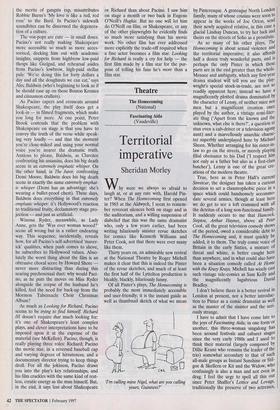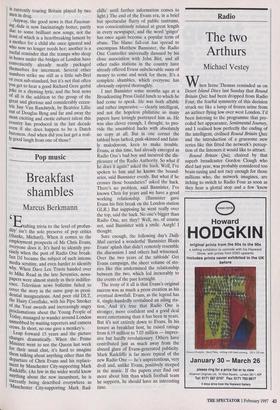Theatre
The Homecoming (National) Fascinating Aida (Vaudeville)
Territorial imperative
Sheridan Morley
Why were we always so afraid to laugh at, or at any rate with, Harold Pin- ter? When The Homecoming first opened in 1965 at the Aldwych, I seem to remem- ber reverent silences both on stage and in the auditorium, and a willing suspension of disbelief that this was the same dramatist who, only a few years earlier, had been writing hilariously sinister revue sketches for comics like Kenneth Williams and Peter Cook, not that there were ever many like them.
Thirty years on, an admirable new revival at the National Theatre by Roger Michell makes it clear that this is indeed the Pinter of the revue sketches, and much of at least the first half of the Lyttelton production is bleakly, blackly, hilariously funny.
Of all Pinter's plays, The Homecoming is probably the most immediately accessible and user-friendly; it is the instant guide as well as thumbnail sketch of what we mean `I'm calling mine Nigel, what are you calling yours, Guinness?' by Pinteresque. A grotesque North London family, many of whose cousins were soon to appear in the works of Joe Orton, send their newly acquired relative, in this case a glacial Lindsay Duncan, to try her luck and theirs on the streets of Soho as a prostitute. As so many of his other plays, The Homecoming is about sexual violence and the territorial imperative; it also affords half a dozen truly wonderful parts, and is perhaps the only Pinter in which these parts are in the end greater than the whole. Menace and ambiguity, which any first-yew' drama student will tell you are the play- wright's special stock-in-trade, are not so readily apparent here; instead we have a magnificently plotted drama dominated by the character of Lenny, of neither mice nor men but a magnificent creation once played by the author, a vintage semi-liter- ate thug (Apart from the known and the unknown, what else is there?', a question to stun even a cab-driver or a television agony aunt) and a marvellously anarchic charac- ter superbly underplayed here by Michael Sheen. Whether arranging for his sister-in- law to go on the streets, or merely playing filial obeisance to his Dad CI respect hint not only as a father but also as a first-class butcher'), Lenny is one of the great cre- ations of the modern theatre.
True, here as in Peter Hall's current Streetcar, the designer has taken a curious decision to set a claustrophobic piece in a space which could handsomely accommo- date several armies, though at least here we do get to see a loft crammed with all the detritus of a long non-functional family. It suddenly occurs to me that Hancock, Steptoe, Arthur Haynes, above all Peter Cook, all the great television comedy shows of the period, owed a considerable debt to The Homecoming and, it must quickly be added, it to them. The truly comic voice of Britain in the early Sixties, a mixture of threat and whine, is better caught here than anywhere, and in what could also have been a situation comedy called At Home with the Krazy Krays, Michell has wisely cast such vintage tele-comics as Sam Kelly and the magnificently lugubrious David Bradley. I don't believe there is a better revival in London at present, nor a better introduc- tion to Pinter as a comic dramatist as well as the master of the sinister and the seri- ously strange. I have to admit that I have come late to the joys of Fascinating Aida; in one form or another, this three-woman singalong has been around festivals and cabaret stages since the very early 1980s and I used to think their material (largely composed by Dillie Keane who remains the leader of the trio) somewhat secondary to that of such all-male groups as Instant Sunshine or SW- goe & Skellern or Kit and the Widow, who confusingly is also a man and not even in drag. I feel the urge to spell all this out since Peter Shaffer's Lettice and Lovage, traditionally the preserve of two actresses, is currently touring Britain played by two men in drag. Anyway, the good news is that Fascinat- ing Aida is now fascinatingly better, partly due to some brilliant new songs, not the least of which is a heartbreaking lament by a mother for a child she once ignored and who now no longer needs her; another is a rueful reminder that the tramps who sleep In boxes under the bridges of London have conveniently already neatly packaged themselves for interment. Several other numbers strike me still as a little sub-Brel or even sub-standard, but it's not that often You get to hear a good Richard Gere gerbil Joke in a rhyming lyric, and the best news of all is the addition to the group of the great and glorious and considerably eccen- tric fssy Van Randwyck, by Beatrice Lillie out of Douglas Byng and far and away the most exciting and exotic cabaret talent this Country has produced in the last decade even if she does happen to be a Dutch baroness. And when did you last get a real- ly good laugh from one of those?



























































 Previous page
Previous page